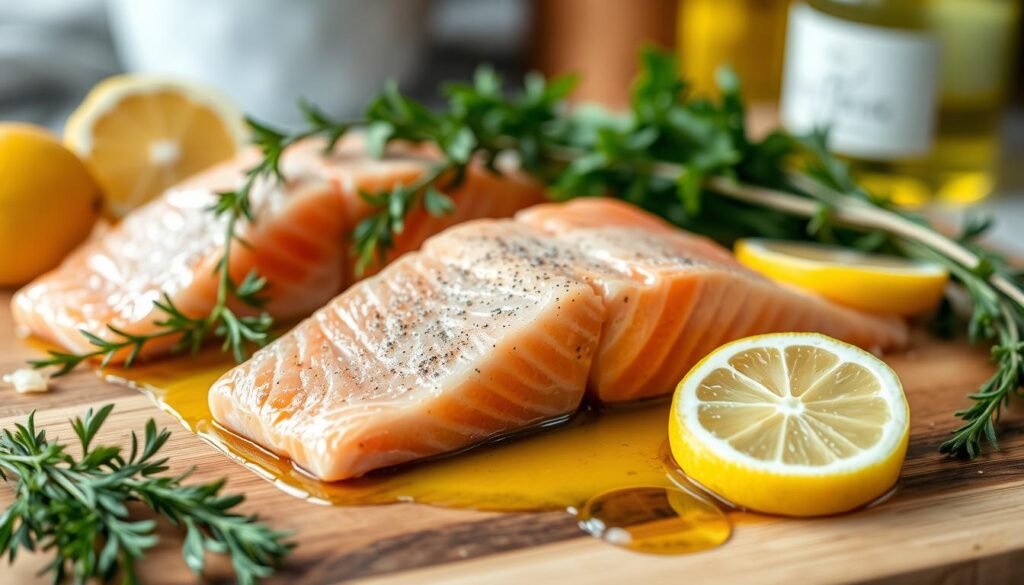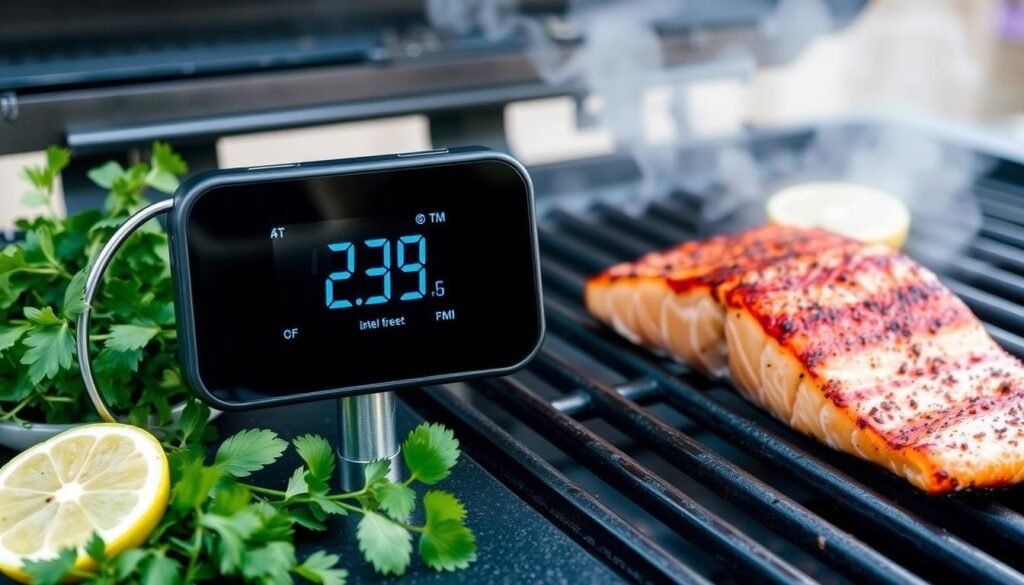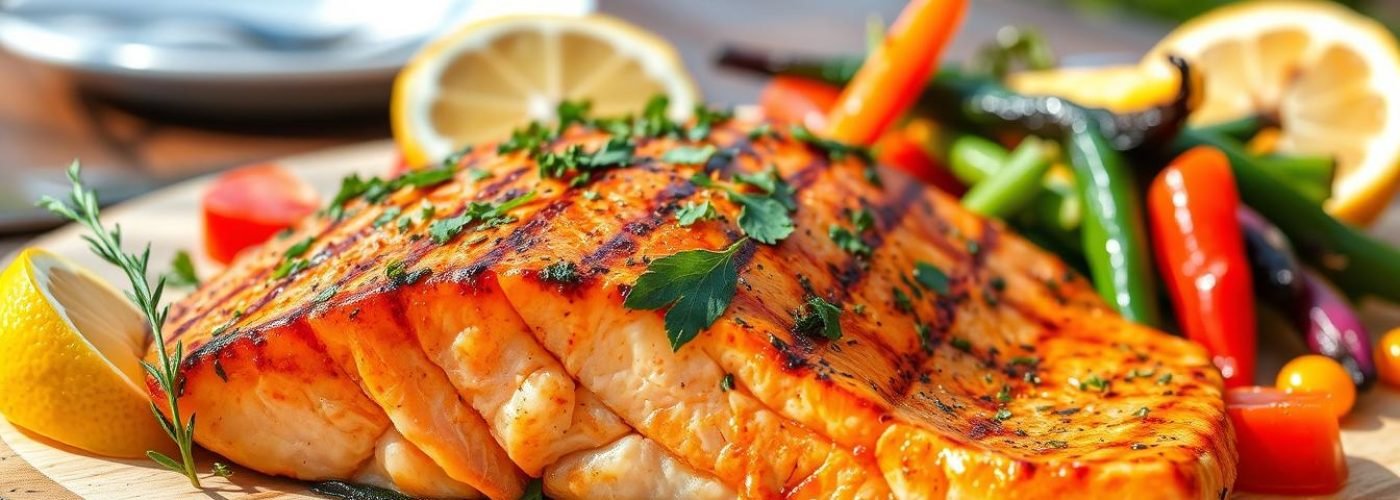Welcome to the delicious world of low-fat grilled salmon, a nutritious grilled salmon option that perfectly balances taste and health. This article will guide you through the many grilled salmon benefits, offering insights into selection, preparation methods, and serving suggestions. With an emphasis on a healthy lifestyle, our healthy salmon recipe is not only easy to follow but also promises to delight your taste buds while supporting your wellness goals.
Join us as we explore why low-fat grilled salmon deserves a spot on your dinner table. Packed with flavor and loaded with essential nutrients, this dish is a convenient way to enjoy a wholesome meal. Whether you’re a seasoned chef or just starting, our tips will help you create the perfect grilled salmon dish right at home.
Introduction to Low-Fat Grilled Salmon
Low-Fat Grilled Salmon represents more than just a simple recipe; it serves as a cornerstone for healthier eating choices. As more individuals seek healthy grilling options, grilled salmon has gained immense popularity among health-conscious food lovers. Its delightful taste and versatility make it a fantastic option for various meals, from casual weeknight dinners to festive gatherings.
One of the compelling factors behind the rise in demand for low-fat salmon recipes lies in the numerous essential nutrients salmon offers. This fish is not just flavorful but also a rich source of protein, heart-healthy omega-3 fatty acids, and various vitamins. Incorporating grilled salmon into your diet can bring both satisfaction and health benefits, appealing to a wide range of dietary preferences.
As you explore the many healthy grilling options available, consider adding low-fat grilled salmon to your menu. Its adaptability allows it to pair beautifully with an array of sides and flavors, ensuring that every meal can be both nutritious and exciting. Embrace the journey of grilled salmon and discover how it can transform your meals into a delightful experience.
The Health Benefits of Salmon
Salmon stands out as a nutritional powerhouse known for its extensive health benefits. Many people appreciate salmon not only for its delicious flavor but also for its rich content of omega-3 fatty acids, protein, and essential vitamins. Understanding these components can enhance your diet and overall well-being.
Heart-Healthy Omega-3 Fatty Acids
Omega-3 fatty acids, prominently found in salmon, play a crucial role in promoting heart health. These fats assist in lowering blood pressure and can significantly reduce the risk of heart disease. The American Heart Association suggests incorporating omega-3-rich foods into daily meals to improve cardiovascular health. Recognizing the salmon health benefits related to omega-3 consumption is essential for anyone aiming for a balanced diet.
Rich Source of Protein
A single serving of salmon is packed with protein, making it an excellent choice for those seeking healthy protein foods. According to the USDA, salmon ranks as one of the premier sources of protein available, which is vital for muscle repair and growth. By including salmon in your diet, you not only enjoy a flavorful dish but also supply your body with essential building blocks for optimal health.
Essential Vitamins and Nutrients
Salmon is a rich source of essential nutrients including vitamins B12 and D, selenium, and potassium. These vitamins play a significant role in maintaining overall health and well-being. Healthline emphasizes the importance of these nutrients for various bodily functions, making salmon not just a tasty choice but an essential component of a healthy diet.
Choosing the Right Salmon for Grilling
When it comes to grilling salmon, understanding the different salmon types is crucial for achieving the best flavor and texture. Choosing between wild salmon and farmed salmon can significantly influence your dish. Each type offers unique benefits, so knowing their characteristics helps in making an informed choice.
Types of Salmon: Wild vs. Farmed
Wild salmon is caught in its natural habitat, usually in the ocean. This type of salmon often has a richer flavor due to its varied diet and natural lifestyle. On the other hand, farmed salmon is raised in controlled environments, leading to a more consistent but sometimes milder taste. Here are key differences:
| Attribute | Wild Salmon | Farmed Salmon |
|---|---|---|
| Flavor | Rich and robust | Milder and more consistent |
| Fat Content | Lower fat | Higher fat |
| Price | Generally more expensive | More affordable |
| Environmental Impact | Generally more sustainable | Varies based on farming practices |
Freshness and Sustainability
Freshness is essential for achieving the best taste in grilled salmon. Look for salmon that is vibrant in color and smells fresh. Choosing sustainably sourced salmon ensures that your culinary choices contribute positively to the environment. Salmon labeled as sustainable often comes from fisheries that follow strict guidelines to protect ocean ecosystems. Opting for fresh salmon options contributes to a flavorful grilling experience while supporting sustainable seafood practices.
Ingredients for Low-Fat Grilled Salmon
Creating a delightful low-fat grilled salmon dish starts with the right ingredients. Selecting high-quality, fresh salmon fillets is crucial for both flavor and health benefits. Healthy salmon options like sockeye or king salmon bring richness that can elevate your meal.
Fresh Salmon Fillets
When it comes to fresh salmon fillets, look for those that are vibrant and firm. Freshness is key to enjoying the best flavor and nutritional value. Sockeye and king salmon are excellent choices, delivering a robust taste and omitting excess fat while offering essential nutrients.
Healthy Marinade Options
A healthy marinade enhances the flavor profiles of salmon without overwhelming it with unwanted calories. You can use a combination of olive oil, lemon juice, and various herbs. These ingredients provide a zesty touch while maintaining the health benefits of the dish.
Additional Seasonings to Consider
Spices play a significant role in boosting flavors. Opt for healthy salmon seasonings like garlic powder, paprika, and black pepper. These choices allow you to explore different taste dimensions while keeping the dish nutritious and low-calorie.

Step-by-Step Instructions for Cooking Low-Fat Grilled Salmon
Cooking low-fat grilled salmon can be both simple and rewarding. Follow these easy steps to create a delicious meal that highlights the flavors of this nutritious fish. Through preparing marinade, marinating salmon, and perfect grilling techniques, you’ll serve up a dish that is sure to impress.
Preparing the Marinade
Start creating your salmon marinade recipe by whisking together essential ingredients like olive oil, lemon juice, mustard, and your choice of fresh herbs. This combination brings a delightful tanginess and depth of flavor, making it a perfect base for the fish. Allow the flavors to meld for about 15 minutes, making sure you achieve an ideal balance.
Marinating the Salmon
To begin marinating salmon, place the fresh fillets in a zip-top bag and pour the prepared marinade over them. Seal the bag tightly. For maximum flavor absorption, refrigerate the salmon for at least 30 minutes. This time allows the fillets to soak up the robust flavors of your marinade, ensuring a delicious outcome.
Perfect Grilling Techniques
Grilling salmon to perfection starts with preheating your grill to medium heat. Lay the marinated salmon skin-side down on the grill and cook for 6–8 minutes. After that period, flip the fish carefully to avoid breaking the fillets. Grill for an additional 4–6 minutes until cooked through. Following these grilling salmon tips guarantees a moist and flavorful dish that everyone will enjoy.
Serving Suggestions for Low-Fat Grilled Salmon
Pairing low-fat grilled salmon with the right side dishes elevates the meal while keeping it nutritious and satisfying. Selecting vibrant, fresh options enhances the overall flavor and visual appeal. Consider these great options to complement your salmon.
Healthy Side Dishes
When considering side dishes for salmon, aim for vibrant colors and a variety of textures. Grilled asparagus and zucchini offer a light and delectable contrast. A fresh garden salad with mixed greens, cherry tomatoes, and a light vinaigrette works wonderfully as healthy sides. Each of these choices brings out the flavor of the salmon while providing vital nutrients.
Pairing with Grains and Vegetables
Integrating grains with salmon can enhance your meal’s heartiness. Quinoa, brown rice, or couscous are excellent options that pair beautifully with roasted vegetables. These not only add a satisfying balance of carbs but also contribute essential nutrients for a well-rounded dish. The combination of protein-rich salmon and wholesome grains creates a fulfilling dining experience.
| Side Dishes | Nutrition Per Serving | Notes |
|---|---|---|
| Grilled Asparagus | 20 calories, 2g protein | Rich in vitamins A, C, E, and K |
| Quinoa | 222 calories, 8g protein | Complete protein with all nine essential amino acids |
| Fresh Garden Salad | 70 calories, 3g protein | High in fiber and antioxidants |
| Couscous | 176 calories, 6g protein | Light and fluffy, pairs well with grilled meats |
| Roasted Vegetables | 90 calories, 3g protein | Adds a variety of flavors and textures |
Macronutrient Breakdown of Low-Fat Grilled Salmon
Understanding the macronutrient composition of low-fat grilled salmon can greatly impact dietary choices. Each serving presents beneficial salmon calories and unlocks various health advantages.
Calories per Serving
One serving of low-fat grilled salmon contains approximately 250 calories. This makes it a nutritious option for individuals aiming for weight management while enjoying a hearty meal. Knowing the nutrition facts associated with salmon assists in making better dietary decisions.
Protein, Fat, and Carbohydrate Content
The macronutrient breakdown reveals that each serving offers around 25 grams of protein, which supports muscle growth and repair. The fat content stands at about 10 grams, primarily unsaturated fats that are heart-healthy. Carbohydrates in salmon are negligible, making it an ideal choice for low-carbohydrate diets.
| Macronutrient | Amount per Serving |
|---|---|
| Calories | 250 |
| Protein | 25 g |
| Fat | 10 g |
| Carbohydrates | 0 g |
Tips for Grilling Salmon Perfectly
Grilling salmon can be a rewarding experience, delivering delicious flavors and textures when done right. Effective temperature control, as well as some useful techniques, can make all the difference. Follow these grilling tips to achieve perfectly cooked salmon every time.
Temperature Control
Maintaining the correct salmon grill temperature is essential for even cooking. Aim for a steady grill temperature between 375-400°F. This range ensures the salmon cooks through without drying out, resulting in a tender and flavorful dish.
Avoiding Overcooking
To prevent overcooked salmon, using a meat thermometer is highly recommended. Target an internal temperature of 145°F for perfectly cooked fish. This technique not only ensures doneness but also maintains the salmon’s moisture and flavor.
Using a Grill Basket or Foil
Utilizing a grill basket or wrapping the salmon in foil provides added benefits. These methods prevent sticking and make flipping the fish easier, allowing for a hassle-free grilling experience. Keeping the salmon secure and moist while cooking can enhance its overall quality.

Flavor Variations for Low-Fat Grilled Salmon
Exploring flavor variations can enhance the enjoyment of low-fat grilled salmon. Experimenting with citrus marinades for salmon offers a lively twist, while the addition of spicy seasoning blends and herbal infusions introduces unique depths of flavor.
Citrus Marinades
Citrus flavors bring brightness and freshness to grilled salmon, making citrus marinades for salmon a perfect choice. Combining orange or lime juice with olive oil, garlic, and herbs creates a zesty blend that compliments the fish beautifully. Marinating for at least 30 minutes allows the citrus to tenderize the salmon while infusing it with delightful flavors.
Spicy Seasoning Blends
A touch of heat can elevate your dish. Try using chili powder, cayenne, or pre-made salmon spice blends to add vibrant flavors without excess fat. These spicy seasoning options create a savory contrast that pairs well with the natural richness of the salmon.
Herbal Infusions
Incorporating fresh herbs can transform your meal. Using herbs for salmon such as dill, cilantro, or basil introduces aromatic notes that brighten the palate. Infusing your marinade with these herbs will result in a fragrant and flavorful experience. Bold herbs not only enhance the taste but also align well with the low-fat nature of grilled salmon.
Storing and Reheating Leftover Grilled Salmon
Properly storing grilled salmon ensures that you can enjoy it later without compromising flavor or safety. Following best practices for storing grilled salmon plays a vital role in maintaining its quality over time. When it comes to leftover salmon storage, keeping it fresh should be your primary concern.
Best Practices for Storage
For optimal results, place leftover grilled salmon in an airtight container. This method not only prevents moisture loss but also inhibits the absorption of unpleasant odors from the refrigerator. Under ideal conditions, you can store grilled salmon for up to 3 days. The key to long-lasting quality is to refrigerate it promptly after cooking.
Ideas for Reusing Leftovers
Using leftover salmon offers a wealth of quick and nutritious meal possibilities. Here are some creative ideas:
- Salads: Flake the salmon into a fresh salad for added protein.
- Wraps: Include it in a wrap with your favorite vegetables and sauces.
- Pasta dishes: Toss salmon with pasta, olive oil, and vegetables for a quick dinner.
| Storage Method | Duration | Tips |
|---|---|---|
| Airtight container | Up to 3 days | Refrigerate immediately after cooking. |
| Freezing | Up to 3 months | Wrap tightly in foil before freezing. |
Pairing Low-Fat Grilled Salmon with Wines
Finding the perfect wine to complement low-fat grilled salmon enhances not just the meal but also the overall dining experience. Selecting the right beverage elevates the rich flavors of the salmon while offering a harmonious balance. Several choices exist, but certain wines stand out as the best wine pairings for this dish.
Best Wine Choices for Salmon
For a delightful combination, consider white wines such as:
- Sauvignon Blanc – Known for its crisp acidity, this wine brightens up the salmon’s flavors.
- Chardonnay – A full-bodied option, especially if oak-aged, providing a creamy texture that pairs beautifully with grilled salmon.
- Pinot Grigio – Light and refreshing, it complements the dish without overwhelming its subtle nuances.
These wines create a delightful contrast, making them prime options for those looking to enjoy wine with salmon during their meals.
Non-Alcoholic Beverage Options
If you’re seeking non-alcoholic drinks with salmon, there are refreshing alternatives that can enhance the meal experience:
- Sparkling Water with a splash of lemon – This combination cleanses the palate.
- Herbal Iced Teas – Options like mint or chamomile offer a soothing and flavorful match.
- Pomegranate Juice – Adds a fruity contrast while maintaining a healthy profile.
Choosing the right beverage can create an outstanding dining experience, leaving guests impressed and satisfied. Whether opting for wine or a non-alcoholic refreshment, there are plenty of options to enjoy alongside grilled salmon.
| Beverage | Type | Flavor Profile |
|---|---|---|
| Sauvignon Blanc | Wine | Crisp and refreshing |
| Chardonnay | Wine | Full-bodied and creamy |
| Pinot Grigio | Wine | Light and refreshing |
| Sparkling Water | Non-Alcoholic | Cleansing and light |
| Herbal Iced Teas | Non-Alcoholic | Soothing and aromatic |
| Pomegranate Juice | Non-Alcoholic | Fruity and tart |
Nutrition Facts and Dietary Considerations
Low-Fat Grilled Salmon serves as an ideal choice for individuals pursuing a low-fat diet. This dish not only delights the taste buds but also aims to meet dietary goals such as weight management and stable blood sugar levels. The rich profile of salmon supports the creation of low-carb dishes, making it a versatile option for various dietary needs.
Low-Fat and Low-Carb Approach
Salmon stands out due to its low-fat content while being an excellent source of high-quality protein. Its nutritional profile aligns perfectly with a low-fat diet, offering healthy fats that promote heart health without unnecessary calories. Those looking for low-carb dishes will find that grilled salmon pairs well with a variety of vegetables or salads, thus enhancing the nutritional value while keeping carbs in check.
Suitability for Various Diets
Further emphasizing its adaptability, this recipe suits many dietary preferences, including gluten-free, paleo, and keto approaches. The inclusion of salmon as a central ingredient allows flexibility for those with specific dietary restrictions. It provides essential nutrients without compromising on taste or health benefits, making it an excellent option for anyone aiming to incorporate wholesome meals into their regimen.
| Diet Type | Compatibility | Key Considerations |
|---|---|---|
| Low-Fat Diet | ✔️ Suitable | Low in saturated fats, high in protein |
| Low-Carb Dishes | ✔️ Suitable | Pairs well with non-starchy vegetables |
| Gluten-Free | ✔️ Suitable | Does not contain gluten |
| Paleo | ✔️ Suitable | Whole, unprocessed foods |
| Keto | ✔️ Suitable | Rich in healthy fats, low in carbs |
Final Thoughts on Low-Fat Grilled Salmon
Low-Fat Grilled Salmon stands out as a delicious and nutritious option for those who are mindful of their diet while still wanting to enjoy flavorful meals. The grilled salmon benefits go beyond taste, offering an impressive array of health advantages. Packed with omega-3 fatty acids, it’s an excellent choice for supporting heart health and providing essential proteins that your body craves.
Moreover, the versatility of this dish allows it to be easily adapted to suit various culinary preferences and dietary requirements, making it a staple in healthy eating. Whether you prefer zesty citrus flavors or earthy herb-infused marinades, grilled salmon can become a highlight of any meal.
Incorporating Low-Fat Grilled Salmon into your weekly menu not only enriches your diet with vital nutrients but also encourages a balanced lifestyle. Embracing such a wholesome dish encourages you to explore new culinary horizons while reaping the health benefits that come with mindful eating. Enjoy the journey to better health, one grilled salmon meal at a time!

